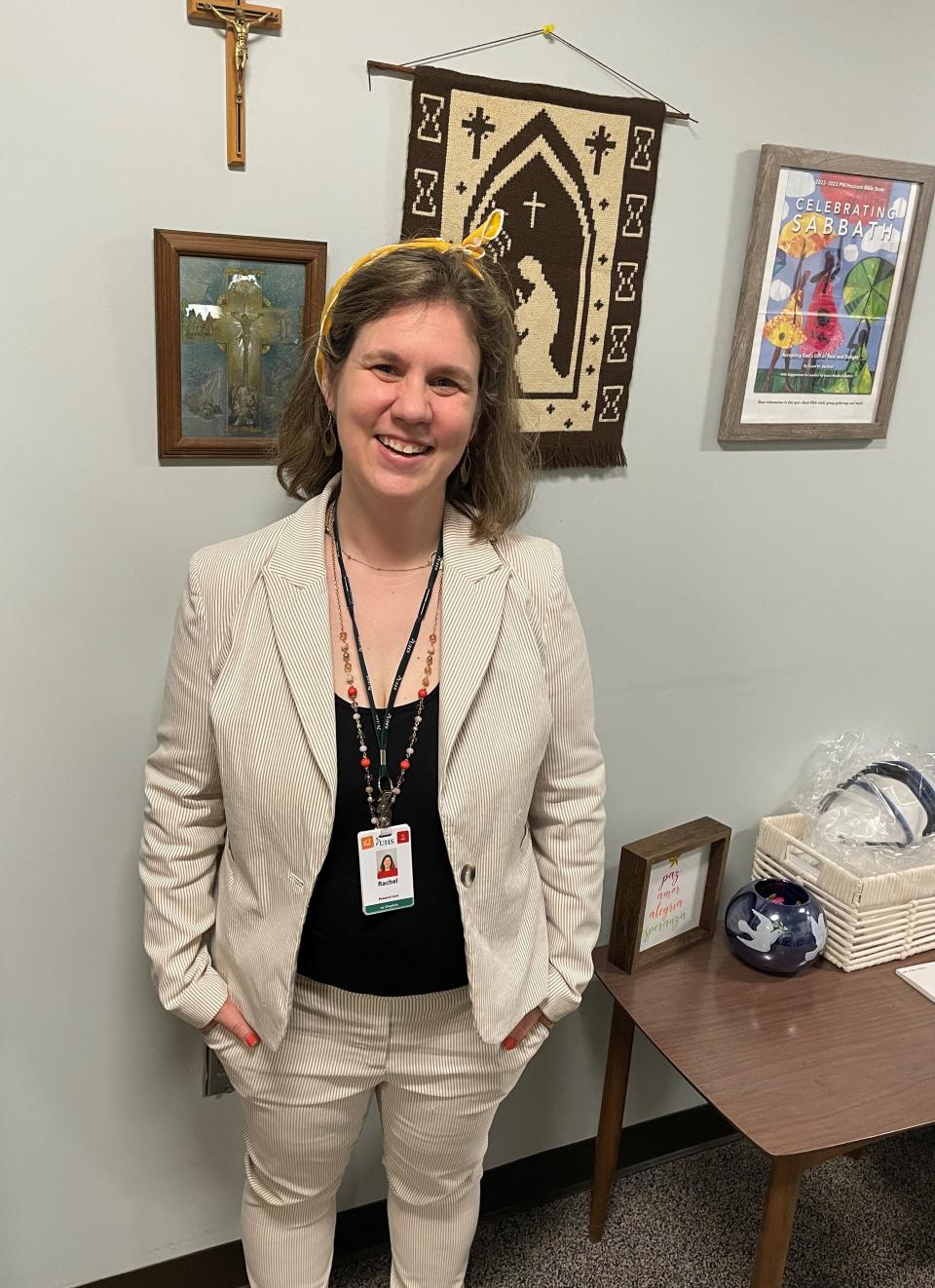In their toughest moments, hospital chaplains help families cope
It’s been a little less than a month since the Rev. Rachel Helgeson took over as lead chaplain at United Health Services. She replaced Deacon Bill Fitzpatrick in the role as of Nov. 1.
Helgeson heads a team that seeks to meet the spiritual needs of patients, staff and visitors at UHS Wilson Medical Center and Binghamton General Hospital. The Presbyterian minister works through the Broome County Council of Churches. Three ordained deacons from the Roman Catholic Diocese of Syracuse are also assigned there as chaplains. They are Ade Ademoyo, Paul Heiland, and Greg Hrostowski.
“Chaplains serve all patients. So even though we're grounded in our own faith traditions,” Helgeson said, ”Our ability is to be present with people on their journey right where they are.”

All four staffers have some form of chaplaincy training. Helgeson said that Clinical Pastoral Education (CPE) is important.
“It's a really rigorous program where you have to go and visit people and you unpack what you've done with your visits. “she said. “Why did you say something? What were the other people trying to say? Where do you meet them in the middle of that? How do you best serve them in that moment?”
Helgeson said there’s another important skill that’s needed before walking in a patient room.
More: These volunteers deliver gifts to people in the Broome County jail and their children
“There's a lot of observation,” she said. “To pay attention to what's going on, but also to put your focus on the person that is being prayed over and to also pay attention to the family and with their responses.”
“We have to know how to walk into clinical situations and be able to navigate what staff are doing, what patients are doing, what families are doing,” Helgeson added.
What’s happening medically can determine the chaplain’s role.
“Sometimes it's better to know, see what's going on, who's there, what's happening,” she said. “If it's a situation where somebody is trying to resuscitate them. Paying attention to whether or not you should physically come into the space or just sit with the family outside.”
Helgeson adds that chaplains also take time with staff to see how they are doing.
“What they do is a calling as well, but it's a lot of work and they see a lot of trauma,” she said “giving them space to be able to verbalize that and have space to reflect on it in between things.”
Death is something the chaplains face at the hospitals. Helgeson said they spend time with family members, find out if there’s a faith tradition and if they want a clergy person contacted. Sometimes she said it’s just sitting with a family member until others come.
“Quite often folks will want a prayer just as a sort of a sending and goodbye with a family member,” she said. “If it's a group of family members, just to gather around the bed and to be able to do that. Together, they're always very sacred moments.”
“But ultimately, in all of those situations, we ask the family what they want,” she added.
If the patient who dies is an organ donor, hospital staff, including chaplains line the hallway in a ceremonial walk of honor. There’s prayer. Then in silence the person is wheeled by. Their family is escorted in front of the group too.
Helgeson is aware there’s a need for her team’s self-care. She and the chaplains keep in close contact to share especially after difficult situations. She seeks some outside interests like singing in a choir, going to the gym, watching TV as well as praying.
“We're more interested in the quality that we are spending with people, not the quantity. And so we may not get to every single person,” she said. “It would be exactly where God calls us to be in those moments, so. So we're giving ourselves the same grace we give our patients and families.”
For more information contact: The Broome County Council of Churches, 607-724-9130, mail@broomecouncil.net
More about Rev. Rachel Helgeson
Position: Director of Hospital Chaplaincy through the Broome County Council of Churches (Lead UHS Chaplain)
Hometown: Kingston, Pennsylvania
Home: Endicott
Age: 44
Denomination: PC (USA) and ordination Sept. 2, 2012
Education: Badger High School, Kinsman, Ohio; undergraduate at Westminster College, New Wilmington, Pa.; Masters of Arts: Vocal Performance, Indiana University of Pennsylvania; Masters of Divinity: Practical Theology Louisville Presbyterian Theological Seminary, Louisville, Kentucky.
Family: parents Rev. Dr John Helgeson & Nancy Loushay Helgeson; daughter, Sophie; son Isaac
This article originally appeared on Binghamton Press & Sun-Bulletin: Binghamton hospital chaplains help patients, families cope

